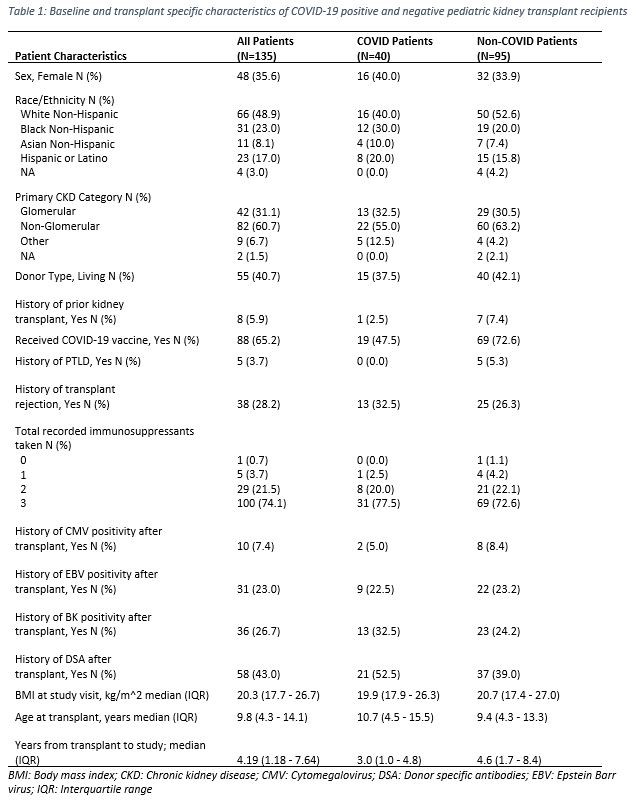Nephrology: Transplant
Nephrology 4: Transplant
36 - A single center retrospective cohort study of risk factors associated with COVID-19 infection in pediatric kidney transplant recipients
Publication Number: 36.349

Uche E. Nwaogazie, MBBS (she/her/hers)
fellow
Childrens Hospital of Philadelphia
Philadelphia, Pennsylvania, United States
Presenting Author(s)
Background:
Pediatric kidney transplant recipients are potentially at higher risk for severe outcomes from COVID-19 infections due to their immunocompromised state and co-morbidities. Despite this concern, little is known about potential risk factors associated with the development of COVID-19 infection in children after kidney transplant.
Objective:
To compare the clinical and laboratory features, and outcomes of pediatric kidney transplant recipients at our center who developed COVID-19 infection to our entire cohort of kidney transplants.
Design/Methods:
We performed a retrospective chart review from March 2020 to February 2022 of our pediatric kidney transplant recipients. Subjects were termed COVID-19 positive if they had a documented SARS-CoV-2 PCR positive test or COVID-19 symptoms plus confirmed exposure (“presumed positive”). Demographic, clinical, laboratory and outcome measures were compared between COVID-19 positive and negative subjects. Differences between cohorts were compared using Chi-square test and Wilcoxon signed rank test as appropriate. Logistic regression analysis with COVID-19 as the outcome variable and controlling for age at transplant and years since transplant was done to determine risk factors for COVID-19 infection. A two-sided p-value of < 0.05 was considered statistically significant.
Results: There were no differences in baseline and transplant specific characteristics including deceased vs living donor transplant, glomerular vs non-glomerular disease etiology, history of rejection, race, sex, or ethnicity between COVID-19 positive and negative cases. A history of COVID-19 vaccination was associated with lower odds of becoming COVID-19 positive (OR: 0.32, 95% CI [0.14, 0.74], p=0.01). A longer time from transplant was associated with lower odds of being COVID-19 positive (OR: 0.87, 95% CI [0.78, 0.97], p=0.01). A history of transplant donor specific antibody (DSA) positivity was associated with higher odds of being COVID-19 positive (OR 2.93, 95% CI [1.24, 6.92], p=0.01).
Conclusion(s): In this single center study, we did not identify race, ethnicity, sex, donor source or disease etiology as risk factors for COVID-19 infection in pediatric kidney transplant recipients. We did observe that vaccination appeared protective and patients who develop COVID-19 infection were more likely to have DSA. Further study with more subjects is warranted to better understand whether these findings reflect intrinsic immune-mediated differences vs. behavioral differences in adherence with treatment recommendations (i.e. vaccines, taking immunosuppressives, etc.).
.jpg)
